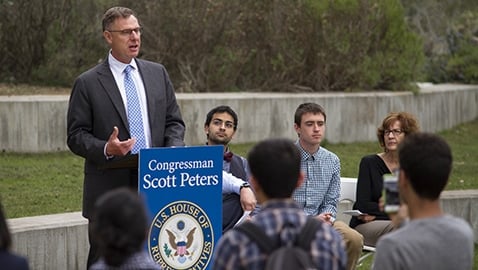Rep. Scott Peters joined student leaders Tuesday to rally for the overturn of the 2010 decision which allows large corporations to support political campaigns
The California Public Interest Research Group and Rep. Scott Peters (D-San Diego.) held a rally at Warren Mall on Jan. 21, where they spoke in favor of overturning Citizens United. Representatives from Money out of Politics and Common Cause, two grassroots organizations, were also invited to speak.
The controversial Supreme Court decision — known officially as Citizens United v. Federal Election Committee (2010) — involved Citizens United, a conservative non-profit organization whose self-described goal is “restoring our government to citizens’ control.”
The Court decision struck down parts of the 2002 McCain-Feingold Bipartisan Campaign Reform Act, which, among other things, prohibited corporations and unions from funding broadcasts that mentioned political candidates by name within 30 days of a primary election. After Citizens United ran advertisements for its 2008 film, “Hillary: the Movie,” within that timeframe of 30 days, the U.S. District Court for the District of Columbia found that the group violated the BCRA. In a 5–4 ruling, the Supreme Court later overturned the judgment, declaring that corporations could freely pay for direct advocacy — as long as it was independent from official campaigns — under the First Amendment.
While some groups welcomed the change, others, like CALPIRG, were less happy.
UCSD CALPIRG organizer Alex Acuna believes that the decision is detrimental to citizens’ rights.
“This issue of Citizens United gets at the heart of every issue that we have ever worked on and will ever work on,” Acuna said. “[Corporations’] voices drown out the voices of everyday people, and the fact that wealthy individuals have so much power now takes away from my right to have free speech and to contribute to the political discourse.”
Peters was elected to Congress in 2013 and has been active in attempts to overturn the Supreme Court decision.
In an interview with the UCSD Guardian, Peters said that the decision “opened the floodgates for unlimited amounts of anonymous spending in campaigns.”
“What we want to do is support a constitutional amendment to fix that problem,” Peters said. “We want to support better campaign finance laws, proper disclosure of who’s funding what and generally want to decrease the influence of money in campaigns.”
He added that politicians spend too much time worrying about fundraising, rather than on important policy issues. CALPIRG shares this view and devotes itself to “developing student leaders and standing up to powerful special interests on behalf of the public.” They now look to UCSD students for support.
“What we’re going to see in the issue of money in politics is that people and corporations will have their own private interests over the public interests,” Acuna said. “As students, the future, if we don’t act, is incredibly bleak. The fact that we had a congressman come to campus and that we had students there who heard and took something away from it is powerful.”
Peters agrees that students have the ability to influence the future.
“It’s students who really have to look ahead,” Peters said. “I think it’s important that we talk to young adults and make sure that they’re engaged and that [they’re] part of the fight to protect our democracy and make sure that it’s not dominated by special interest money.”
Peters previously served on the San Diego City Council before becoming the representative for California’s 52nd congressional district — which covers much of East Campus — in 2013.








